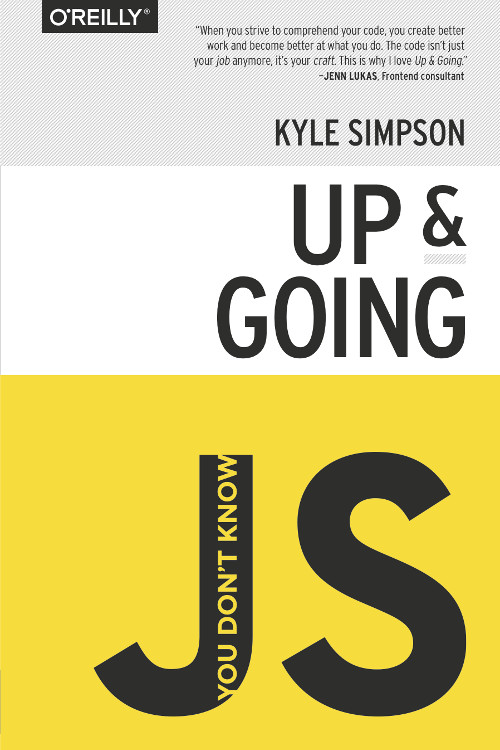I’m sure you noticed, but “JS” in the book series title is not an abbreviation for words used to curse about JavaScript, though cursing at the language’s quirks is something we can probably all identify with! From the earliest days of the Web, JavaScript has been a foundational technology that drives interactive experience around the content we consume. While flickering mouse trails and annoying pop-up prompts may be where JavaScript started, nearly two decades later, the technology and capability of JavaScript has grown many orders of magnitude, and few doubt its importance at the heart of the world’s most widely available software platform: the Web. But as a language, it has perpetually been a target for a great deal of criticism, owing partly to its heritage but even more to its design philosophy. Even the name evokes, as Brendan Eich once put it, “dumb kid brother” status next to its more mature older brother, Java. But the name is merely an accident of politics and marketing. The two languages are vastly different in many important ways. “JavaScript” is as related to “Java” as “Carnival” is to “Car.” Because JavaScript borrows concepts and syntax idioms from several languages, including proud C-style procedural roots as well as subtle, less obvious Scheme/Lisp-style functional roots, it is exceedingly approachable to a broad audience of developers, even those with just little to no programming experience. The “Hello World” of JavaScript is so simple that the language is inviting and easy to get comfortable with in early exposure. While JavaScript is perhaps one of the easiest languages to get up and running with, its eccentricities make solid mastery of the language a vastly less common occurrence than in many other languages. Where it takes a pretty in-depth knowledge of a language like C or C++ to write a full-scale program, full-scale production JavaScript can, and often does, barely scratch the surface of what the language can do. Sophisticated concepts that are deeply rooted into the language tend instead to surface themselves in seemingly simplistic ways, such as passing around functions as callbacks, which encourages the JavaScript developer to just use the language as-is and not worry too much about what’s going on under the hood. It is simultaneously a simple, easy-to-use language that has broad appeal and a complex and nuanced collection of language mechanics that without careful study will elude true understanding even for the most seasoned of JavaScript developers. Therein lies the paradox of JavaScript, the Achilles’ heel of the language, the challenge we are presently addressing. Because JavaScript can be used without understanding, the understanding of the language is often never attained.
- You Don't Know Js Yet Pdf
- You Don't Know Js Pdf Download
- Aug 09, 2020 Addeddate 2020-08-09 10:03:40 Identifier you-don-t-know-js202008 Identifier-ark ark:/13960/t9b65mn66 Ocr ABBYY FineReader 11.0 (Extended OCR) Pagenumberconfidence.
- Aug 06, 2020 The worldwide best selling You Don't Know JS book series is back for a 2nd edition: You Don't Know JS Yet. All 6 books are brand new, rewritten to cover all sides of JS for 2020 and beyond. You'll still get in-depth coverage of the core language, applied in useful code organization patterns for your programs.
Look into the nature of JS objects and why you’d need to point to them Learn how developers use the mixin pattern to fake classes in JS Examine how JS’s prototype mechanism forms links between objects. A book series on JavaScript. @YDKJS on twitter. Contribute to getify/You-Dont-Know-JS development by creating an account on GitHub. Turn your raw data into real knowledge by creating and deploying complex data visualizations with D3.js About This Book Understand how to best represent your data by developing the right kind of visualization Explore the concepts of D3.js through examples that enable you to quickly create visualizations including charts, network diagrams,.
No packages eligible for install mac. No matter how much experience you have with JavaScript, odds are you don’t fully understand the language. As part of the “You Don’t Know JS” series, this compact guide focuses on the new features that will be available to developers in ECMAScript 6, the newest version of the standard on which JavaScript is built.
Book Description
Topics included: ES? Now & Future • Syntax • Organization • Async Flow Control • Collections • API Additions • Meta Programming • Beyond ES6.

You Don't Know Js Yet Pdf

Download Free PDF / Read Online
You Don't Know Js Pdf Download
Author(s): Kyle Simpson
Publisher: O’Reilly Media
Published: April 2015
Format(s): HTML(Online)
File size: –
Number of pages: 272
Download / View Link(s): Online
